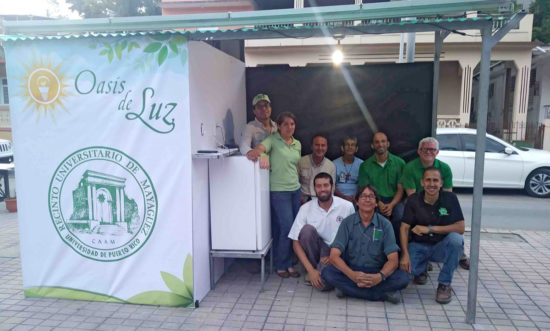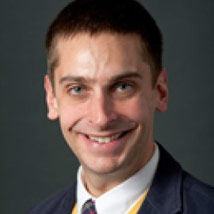Engineering Projects in Community Service (EPICS) is a program that is making a lasting impact on students and communities around the world. EPICS in IEEE empowers students to work with local service organizations and use their technical knowledge to help a community in need. The program fosters technological innovation while benefiting humanity. It not only helps the communities, but also helps students to broaden their skills through engineering-based projects and encourages them to pursue engineering as a career for community improvement. Our program is directly in line with the IEEE motto: Advancing Technology for Humanity.
 One EPICS in IEEE project that benefitted both the students and the community, focused on powering an orphanage in Honduras with solar energy. Montaña de Luz is a home to children affected by HIV/AIDS, providing them with refuge, empowerment, and hope. However, this orphanage in rural Honduras had expensive and unreliable electricity, with frequent power outages, disrupting the lives of staff and children. EPICS in IEEE awarded a $10,000 grant to the engineering students at Ohio State University (OSU) to create a new solution for this orphanage. The students implemented a 1250W solar generator, repaired a 400W wind turbine generator, replaced bulbs with high- efficiency LED light bulbs, and taught workshops for children to learn everything from creating small nightlights to solar-powered flashlights. Thanks to EPICS in IEEE and the OSU students, this greatly reduced the orphanage’s electricity bill, allowed vital appliances to stay running during a power outage, and even provided them with valuable skills to create power of their own.
One EPICS in IEEE project that benefitted both the students and the community, focused on powering an orphanage in Honduras with solar energy. Montaña de Luz is a home to children affected by HIV/AIDS, providing them with refuge, empowerment, and hope. However, this orphanage in rural Honduras had expensive and unreliable electricity, with frequent power outages, disrupting the lives of staff and children. EPICS in IEEE awarded a $10,000 grant to the engineering students at Ohio State University (OSU) to create a new solution for this orphanage. The students implemented a 1250W solar generator, repaired a 400W wind turbine generator, replaced bulbs with high- efficiency LED light bulbs, and taught workshops for children to learn everything from creating small nightlights to solar-powered flashlights. Thanks to EPICS in IEEE and the OSU students, this greatly reduced the orphanage’s electricity bill, allowed vital appliances to stay running during a power outage, and even provided them with valuable skills to create power of their own.
Another notable project brought Internet access to the remote community of Abisinia in Nicaragua. With no Internet, children did not have any access to computers in school, putting them at a huge disadvantage to those who had the means to access and share endless information online. In addition, the community’s health clinic was overpopulated with patients who doctors believed could have avoided a visit if they had Internet access to educate themselves on the risks of pollution, especially because the streets were covered in trash. EPICS in IEEE funded a $8,727 grant for this community’s need to the IEEE Student Branch at Villanova University in partnership with Ruben Dario High School (New Guinea) and the Nicaraguan nonprofit organization Association for Local Government (APRODEL). Thanks to the opportunity afforded by EPICS in IEEE, this community now has an Internet café located within 100 yards of the school and health clinic, acting as a new hub for the community.
Without the support of the students, local organizations, and those who have donated to EPICS in IEEE, these communities would not have the technology or education they have today. It is those who feel a strong call to action to do the right thing who provide immense resources required for these projects. They are the ones who inspire and enable the next generation of engineers and scientists and greatly improve the quality of life for communities around the world.
 It is projects like these which EPICS in IEEE supports to provide students with an opportunity to develop devices and systems to aid communities worldwide. Whether it’s providing hot water to a camp in Canada, electricity to communities in Pakistan, or mobility for disabled children in the United States, EPICS in IEEE works to provide financial support to make these projects possible — building stronger students, stronger communities, and a stronger tomorrow.
It is projects like these which EPICS in IEEE supports to provide students with an opportunity to develop devices and systems to aid communities worldwide. Whether it’s providing hot water to a camp in Canada, electricity to communities in Pakistan, or mobility for disabled children in the United States, EPICS in IEEE works to provide financial support to make these projects possible — building stronger students, stronger communities, and a stronger tomorrow.
In today’s technology-based world, community service agencies need to utilize technology to help those in need. These communities need the help of those with strong technical backgrounds to best assist them, something that EPICS in IEEE acknowledges and uses to their advantage.
EPICS in IEEE stands out as a nonprofit by not only assisting communities in their local challenges, but also encouraging students to pursue engineering as a career for community improvement. By using engineering as the basis of their community service, they were able to better the community and students in ways other community service agencies could not. EPICS in IEEE is not only transforming lives, but inspiring careers.
 Nicholas J. Kirsch is an Associate Professor in the Department of Electrical and Computer Engineering at the University of New Hampshire. He obtained his B.S. degree in Electrical Engineering from the University of Wisconsin – Madison in May 2003. Nicholas received an M.S. degree in Electrical Engineering and Telecommunications in June 2006 and a Ph. D. in Electrical Engineering in June 2009 from Drexel University in Philadelphia, Pennsylvania. In 2001 and 2002, Nicholas worked for W.L. Gore & Associates on fiber optic link modules and long-wavelength lasers. In graduate school, he worked with the Drexel Wireless Systems Laboratory and the Applied Communication and Information Networking group in Camden, NJ. His research interests include Multiple-input multiple-output (MIMO) communications systems, wireless sensor networks,
cognitive radio, software defined radios, transparent antennas, and spectrum sensing technologies. This work is supported by the National Science Foundation, University of New Hampshire, and the Institute of Electrical and Electronic Engineers. Nicholas is currently the chair of the Engineering Projects in Community Service in IEEE program, which funds students to solve problems and engage with local non-
profit organizations. Nicholas is a member of IEEE, Eta Kappa Nu, and AAAS.
Nicholas J. Kirsch is an Associate Professor in the Department of Electrical and Computer Engineering at the University of New Hampshire. He obtained his B.S. degree in Electrical Engineering from the University of Wisconsin – Madison in May 2003. Nicholas received an M.S. degree in Electrical Engineering and Telecommunications in June 2006 and a Ph. D. in Electrical Engineering in June 2009 from Drexel University in Philadelphia, Pennsylvania. In 2001 and 2002, Nicholas worked for W.L. Gore & Associates on fiber optic link modules and long-wavelength lasers. In graduate school, he worked with the Drexel Wireless Systems Laboratory and the Applied Communication and Information Networking group in Camden, NJ. His research interests include Multiple-input multiple-output (MIMO) communications systems, wireless sensor networks,
cognitive radio, software defined radios, transparent antennas, and spectrum sensing technologies. This work is supported by the National Science Foundation, University of New Hampshire, and the Institute of Electrical and Electronic Engineers. Nicholas is currently the chair of the Engineering Projects in Community Service in IEEE program, which funds students to solve problems and engage with local non-
profit organizations. Nicholas is a member of IEEE, Eta Kappa Nu, and AAAS.
